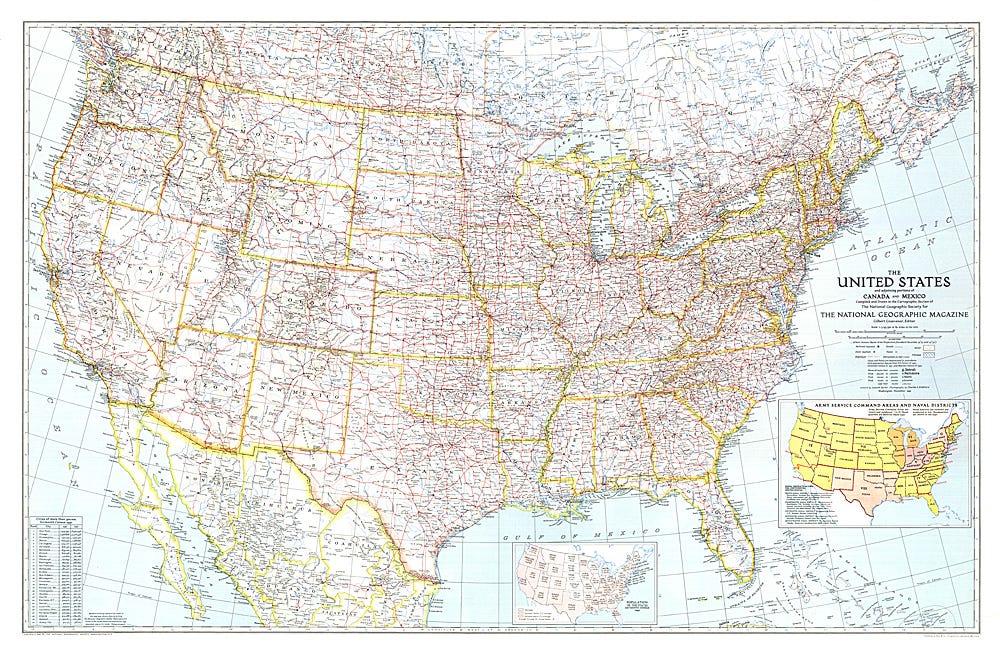🌍 The Empire's Shadow: How Bird Poop and Racial Politics Shaped American Expansion
🌋 Rebels, Bases, and Beatlemania: The Unexpected Echoes of American Imperialism. A Shocking Journey Through America's Hidden Imperial History

😽 Keepin’ It Simple Summary for Younger Readers
👧🏾✊🏾👦🏾
🇺🇸 The United States is much bigger and more complicated than the 🗺️ map most people know. Throughout history, the country took over many 🌴 islands and 🏞️ lands where people lived differently. Sometimes, the U.S. treated these people badly, using them as workers 👷♂️ or test subjects 🧪. These hidden parts of America's story 📜 show that the country's history is much more complex than just the main 50 states 🗺️ we usually see on maps.
🗝️ Takeaways
🗺️ The U.S. mainland map is a massive historical simplification that erases entire populations and territories
🏴 By 1945, more people lived under the U.S. flag in colonies than on the mainland itself
🩺 Medical researchers like Cornelius Rhodes used territorial populations as experimental subjects with shocking impunity
🎸 Cultural innovations like the Beatles emerged from unexpected imperial contact zones
🌐 Modern U.S. global influence operates through a network of strategic military bases rather than direct territorial control
Hidden Threads: America's Invisible Empire and the Stories We Refuse to Tell
When you look at a map of the United States, do you ever think about or include Puerto Rico, the Virgin Islands, or American Samoa?
Chances are, you don't.
And that's precisely the point of a revelatory episode of "On the Media,” with host Brooke Gladstone, that tears apart our comfortable misconceptions about American geography, identity, and empire.
The latest podcast isn't just a history lesson—it's a mirror reflecting the profound contradictions at the heart of American identity.
Through historian Daniel Immerwahr's groundbreaking work, we're confronted with a version of U.S. history that most textbooks deliberately omit: the story of an empire built on racial exclusion, strategic opportunism, and systematic erasure.
The Guano Chronicles: An Imperial Origin Story
Few could imagine that bird droppings—yes, guano—would be the unlikely catalyst for American territorial expansion. In the 19th century, these islands of accumulated bird excrement were dubbed "white gold," critical for agricultural fertilization.
But the human cost was staggering. African American men were deceived into brutal labor conditions, essentially trapped on remote islands and forced to mine under horrific circumstances.
The Navassa Island incident epitomizes this brutal history. When workers mutinied against their oppressive conditions, killing white overseers, their legal defense exposed the constitutional gymnastics of American imperialism.
Remarkably, they argued that since Navassa wasn't technically part of the United States, federal law shouldn't apply—an argument that ultimately helped establish the legal framework for U.S. territorial expansion.
Cartographic Manipulation: The Invisible Territories
Most of us grow up with a mental image of the United States as that familiar contiguous blob—the lower 48 states stretching from coast to coast, maybe with Alaska and Hawaii as occasional afterthoughts.
But this map is a lie—a carefully constructed fiction that deliberately erases entire populations, histories, and complex realities of American territorial existence.
Consider American Samoa, where people are born on U.S. soil but aren't automatically U.S. citizens, or Puerto Rico, where 3.2 million U.S. nationals live in a perpetual state of constitutional limbo.
For most of its history, the United States has been far more than those neatly bordered states. By the end of 1945, you were statistically more likely to live under a U.S. flag in a colony or occupied zone than on the mainland itself.
Cultural Echoes of Imperialism
The episode reveals how imperial presence creates unexpected cultural ripples. Liverpool's musical revolution was directly linked to the massive U.S. military base nearby.
The Beatles emerged from a cultural "contact zone" where American servicemen exchanged records and instruments with local musicians.
Even more chillingly, Osama bin Laden's anti-American jihad can be traced to the very U.S. military bases his father helped construct in Saudi Arabia—a perfect metaphor for how imperial overreach generates its own resistance.
Medical Atrocities and Scientific Racism
The story of Cornelius Rhodes is particularly haunting. A Harvard-trained doctor in Puerto Rico, Rhodes viewed the island as a laboratory for medical experiments.
His racist writings describing Puerto Ricans as a population to be "exterminated" were not just private musings—he actually induced diseases in patients and sought to kill them.
More shocking? Rhodes faced no meaningful consequences. He went on to become a key figure in developing chemotherapy, his earlier colonial atrocities conveniently forgotten.
The Ongoing Legacy
Our deliberate geographical blindness isn't accidental.
It's a mechanism of power.
By making these territories invisible, we avoid confronting American imperial expansion's complex, often brutal realities. We maintain a comforting narrative of American exceptionalism that conveniently ignores the experiences of millions.
Today's U.S. imperial strategy has evolved. Instead of extensive territorial holdings, we maintain a "point-to-list empire" through hundreds of overseas military bases. These strategic outposts continue to shape global dynamics, often in ways we refuse to acknowledge.
A Challenge to Our National Imagination
The next time you look at a map, ask yourself: What stories are being left out? Whose experiences are being erased? The boundaries we draw are never just lines on paper—they're statements about who we consider fully human, fully American.
The United States has never been just the contiguous map we imagine. It's a complex, often brutal network of territories, interactions, and power dynamics that extend far beyond artificial borders.
Our map is not our territory. And it's time we learned to see the whole picture.
Our challenge is to listen to these hidden stories, to recognize the full complexity of our national identity, and to build a more honest understanding of how we became who we are.








Thanks for posting this. Yes, the USA has over 750 overseas military bases, and at what cost (both financially and environmentally)? Among these is Pituffik (formerly known as Thule) in Greenland. Let us hope that this station does not become pivotal in a possible Trump plan to expand our influence!